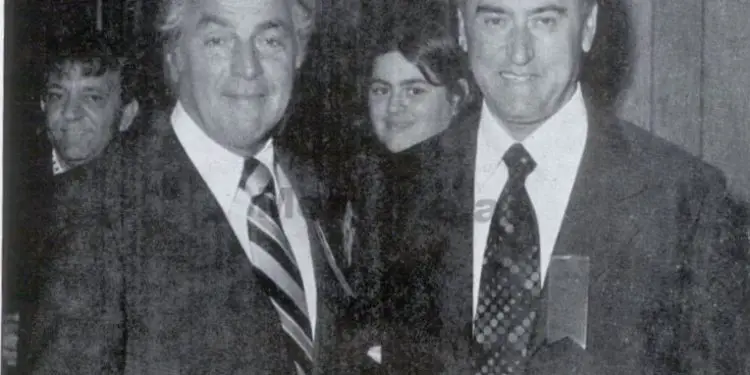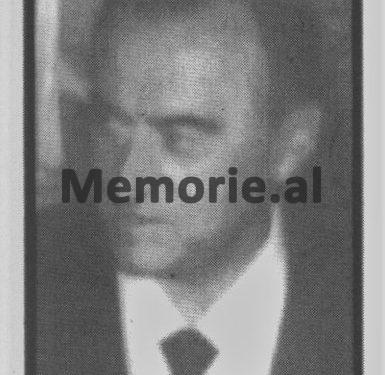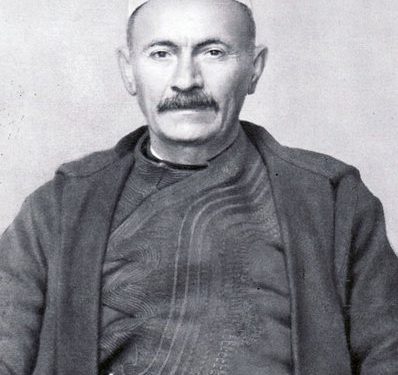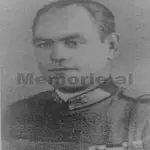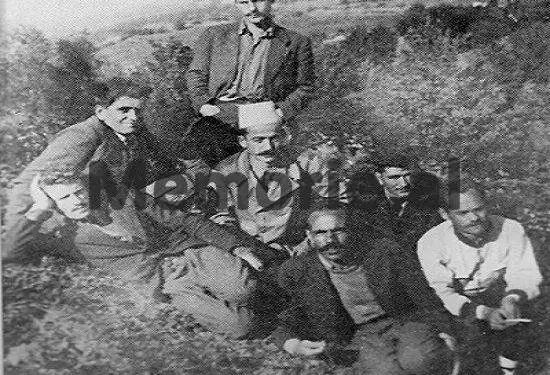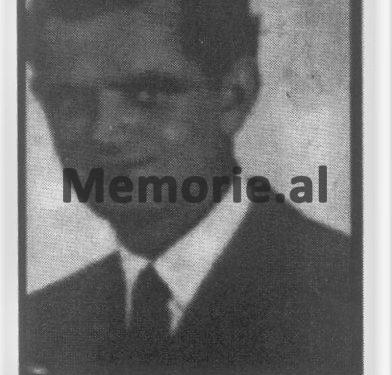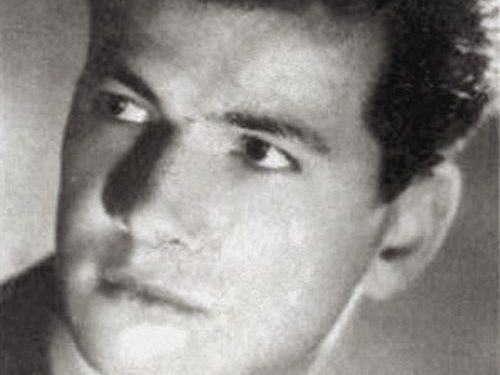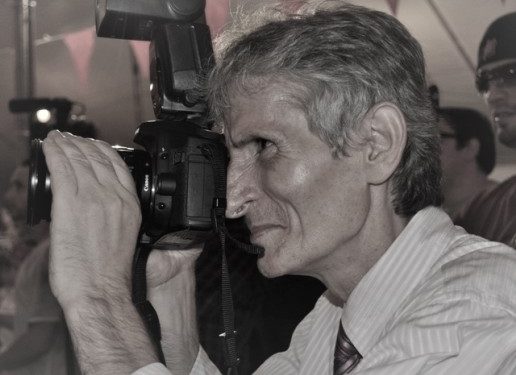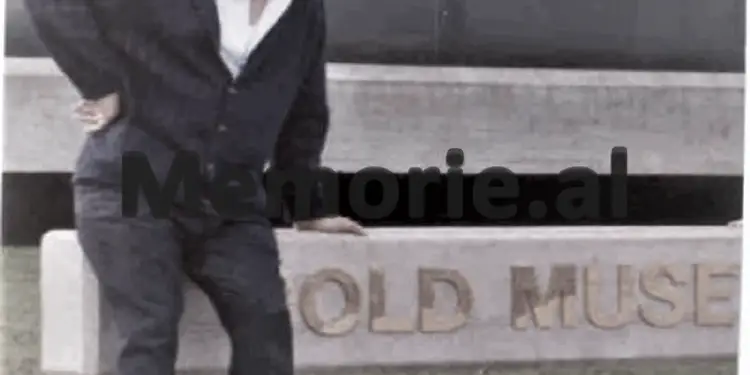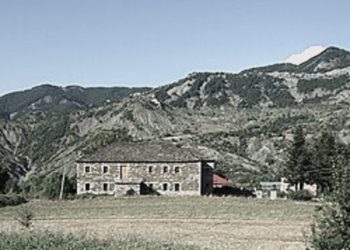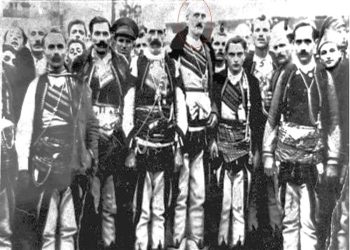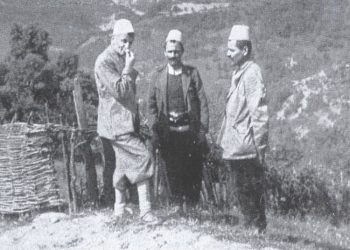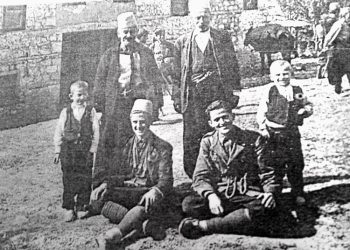By Beqir Sina
– In honor of the great Albanian patriot, Isa Ndreu, who lived and worked in Italy and his brother, Selman, who, after suffering in prisons and internment camps, died abandoned in the Sanatorium of Tirana
Memorie.al / Isa Ndreu were born in Slovo di Dibra on March 7, 1919. He received his first lessons in Kastriot di Dibra, in that school that no longer exists today. After primary education, the clever and intelligent boy would feel the need for education and, having the support of his family, attended the “Normal” school in Elbasan. But for many reasons, with the support of his father, Ceni, he would finish high school at the “Manzoni” Institute in Florence, Italy, where he graduated from the Faculty of Law.
The environment where he grew up and his very personality were molded as anti-communist. Even though he was not under the communist hoof, his activity and work would always be in an effort to create or consolidate an anti-communist group, which would work for the awareness of the entire diaspora, to stay united around anti-communist ideas, preserve the identity and not to lose the Albanian tradition and language.
The Albanian diaspora not only recognized him but also honored and respected his activity, elevating it to the highest level, which belongs to a patriot. Isa Ndreu’s patriotic activity is truly a very patriotic and dignified act, for the great support he has given to the Albanian language press throughout the Albanian diaspora. Reaching the level of a well-known industrialist, he would put a good part of the capital at the service of the national cause.
In a speech on the occasion of the anniversary of the “Koha e Jonë” magazine, he says: “Of course, in this enterprise I was inspired by my ancestors, who in different eras gave everything they had for the national cause, sacrificed their lives and wealth, everything and that for Albanian ideals, principles and moral traditions, if they were alive, they would have continued to fight”.
With the work and unwavering support of all patriots and intellectuals of the diaspora, create the Democratic Union Party.
This party emerged as a merger of the anti-communist groups of the Albanian National Union, as well as the Katundare Party. The agreement for the merger of these groups and the creation of the Democratic Union Party was reached in New York on November 28, 1972, where a provisional council was also elected which would prepare the platform, regulation, program and statute of the Democratic Union Party. The decision to create the Democratic Union Party was taken at the First Assembly held on September 8, 1974, in one of the most prestigious hotels in Florence, the “Joily Hotel”, formerly known as the “Charlton” Grand Hotel.
The political and propaganda activity of the Democratic Union Party, not only within the borders of Italy, where it was announced, but also abroad, has had a great echo and has enjoyed political support from Western circles as well. In its assemblies, where two of them were held outside the country and two in Albania, foreign intellectuals and political activists, including not only those from Italy and the entire Western world, but also American congressmen, have participated and welcomed its activity. .
With the arrival of the first Albanian refugees on Italian soil, Isa Ndreu, on behalf of the Albanian Democratic Union Party, would address the chairman of the Council of Ministers of Italy, Xulio Andreoti, letting him know that the arrival of these refugees through a route so dangerous, escaping drowning and border guards, should be assessed and all efforts made to systematize them.
Isa Ndreu, the great patriot who fought and worked his whole life for the Albanian cause
Isa Ndreu, this great colossus of emigration in the Albanian diaspora, passed away these days, in Florence, Italy, leaving in the memory of his compatriots, the image of an outstanding personality, for the patriotism, national spirit and organized activities, in political-social movements of immigrants in the diaspora, during more than half a century.
Born in 1919, in Slovakia of Dibra, in a large feudal-bourgeois family, known for excellent patriotic traditions, with a constellation of outstanding intellectuals and with nationally and internationally recognized leaders. Under the example of prominent figures of this family such as: Elez Isufi, Sufë Xhelili, Cen Elezi, Dali Ndreu, Esat Ndreu, Xelal Ndreu and dozens of other prominent intellectuals of this family, who worked in the high administration of the pre-communist period, would serve as models to educate and inspire in the soul of Isa Ndreu high ideals that transcend the limits of self.
His childhood, he followed the paths of knowledge from the school of Kastriot in Dibra, to the “Normale” of Elbasan, to the Manzoni Faculty of Economics in Italy and would finish them at the Faculty of Law in Florence. After his graduation, Isaja would devote himself to the field of business administration, where his skills would shine in the jewelry manufacturing industry, having purchased and put into production a prestigious silver jewelry, jewelry factory, built within a large olive plantation, in the middle of Florence. For Isa Ndreu, only economic success was not enough, his heart beat for the land of his ancestors, that inner spiritual energy pushed him towards patronage, humanitarianism and patriotism.
To prominent patriots in the diaspora with whom he had continuous cooperation, he repeated his postulate: “Love Albania and work for it, because it is our honor.” On the right side of Isai’s political activity, there were well-known intellectuals, such as: Nermin Vlora (Falaski), ambassador Renxo Falaski, lawyer Adem Hodo from Saranda, residing in Florida, America, who, when asked by his relatives in Albania, for the diaspora, it was said: “We have a flower in the diaspora whose name is Isa Ndreu”, the well-known sociologist from Shkodran living in New York, Loro Stajka, the talented publicist from Shkodran living in Paris and the publisher of the magazine “Koha e Re”, Lec Shllaku, and many others…!
In 1974, with the presence of the most prominent intellectuals of the Albanian diaspora, who came from the western countries where they had been living for several decades, Isa Ndreu, in a grand meeting in Florence, announced the Party “Albanian Democratic Union” as the carrier and conductor of the messages of unity, cooperation, and pan-Albanian integration to keep alive the feeling of love for the homeland and to show the western world where Albania was led by the brutal Stalinist regime. As its spokesperson, PBDSH had the magazine “Koha e Re”, which was sponsored and distributed for free in the diaspora for 30 consecutive years, by Isa Ndreu.
In an article in “Gazeta e Athina” dated 24.05.2002, in an expanded article entitled “Prominent figures of the diaspora, the Greek journalist of early Albanian origin, Kristo Zharkalli, writes: One day I was surprised when I received a letter from the hand of Isa Ndreu, this famous man, whom you had written, with his own hand. He wrote me several lines of kindness. (“I am very pleased that we have a compatriot in the heart of Greece and that our magazine is appreciated by you and I would beg you if there are other Albanians there, make our magazine known. I look forward to meeting you in Florence and I wish to consider you a friend”.
Since then I have had regular correspondence, meetings with him and he has helped me continuously, as have many other intellectuals. Isa Ndreu led an active national life and maintained close ties with all circles of Albanian emigration, and especially with the Arbëresh people of Italy and the Kosovar emigration.
The magazine “Koha e Re”, directed by the well-known publicist from Shkodran, Lec Shllaku, who lived in Paris, (here he also published the magazine) became a spokesperson and expression of Albanian national aspirations, of cultivating and enlivening the fiery feelings of patriotism, and it was an important political-cultural information that connected the Albanians with the exile after 1974, at the time of the height of the class war in Albania, isolated by the communist dictatorship.
On the occasion of the 500th anniversary of the death of the National Hero Gjergj Kastrioti Skënderbeg, it was Isa Ndreu and Lec Shllaku, respectively the chairman and secretary of the “Albanian Democratic Union” Party, who named a square in Paris, France, “Gjergj Kastrioti-Skënderbeg” . It was the tireless effort of Isa Ndreu, his devotion and persistence that in 1978, the square was approved by the Paris Municipality (City Council) with the mayor Jacques Chirac. (Former President of France).
It was a stunning and prestigious manifestation of immigrant intellectuals in the diaspora, who came from Italy, Greece, America, Canada, Germany, Australia, etc., to inaugurate Paris’ Skanderbeg Square. All the expenses of this international activity were sponsored by Isa Ndreu, even the travel tickets of the participants and their accommodation.
Isa Ndreu in the memories of his friends, colleagues and associates was truly a myth. He was a large-scale businessman who penetrated international markets as far away as Japan with high-quality silver jewelry products produced by his gold and silver jewelry factory.
On the other hand, he was a warm, loving and humane friend, correct and very kind. When we first met with Lec Shllak in Tirana, who came in 1993, to get to know the PBD, in Albania, I was surprised that he never mentioned the name Isa, without putting the word God before him. Then, as the General Secretary of the “Albanian Democratic Union” party, I had the good fortune to communicate with Isa, also having him as the party chairman of the PBD, in the III and IV Congresses.
There was a man who always told us: “Help Albania, democracy, gets rid of communism and support the Democratic Party with President Berisha”. In the years when the Democratic Party ruled and Mr. Berisha was the President, Isa Ndreu was decorated with the High Order “For outstanding activity, for the benefit of the Albanian national issue”.
Isa Ndreu remembered the meetings with Mr. Berisha as wonderful events in his life, as his heart was filled with inspiration and longing when he watched his homeland, Albania, progress and democratize. He died at the age of 86, leaving us like a meteor in the blue sky of motherly love that leaves behind a bright wake. Like the prominent figures of art and culture, those of international business enrich the treasury of our national history. Let these notes remain instead of a tribute to his work and life.
Memories of Dr. Lazar Radit, for Selman Ndreu
“It was the summer of 1937. One hundred Albanian students, the ten best students from the ten high schools of Albania, were invited to Italy to spend a month of summer vacation, on the beach of Anzio and in the magnificent building “Ital-cable “-s that accommodated us, we had the opportunity not only to go to the beach but also to engage in gymnastic exercises and various sports games.
It was only natural that through all those students, a great football team was created. Under the training of two distinguished professors: Prof. Alush Lleshanaku and Prof. Irfan Tërshana, we trained several days in a row. The city of Anzio and that of Nettuno, officially invited us to play with the team of their cities.
We played the first match in the city of Anzio on July 25, 1937. It was a beautiful game, very correct and technical. The match ends 3-1 in favor of our team. Next Sunday we play the second game in Nettuno. We won there too with the result 1-0. I am not exaggerating to say that we won the sympathy and admiration of all Italian spectators.
Albanian fans were only the rest of the hundred Albanian students. This could really be called an Albanian national team with sports talents who later distinguished themselves in Sport-Club “Tirana”, “Vllaznia”, “Teuta”, and “Skënderbeu”. Halim Begeja, Xhuxha, Deliallisi, Mema were there and Selman Ndreu, etc.
Among all the players, I had a special company and friendship with Selman Ndreu. For a long time we preserved and cultivated the friendship of the school years. The war and ideological division of the years 1943-1944 separated us completely and cut off all contact, even correspondence. At the time of the exile, the Ndret had concentrated them in two large centers in Lubonje in Vlora and Shtyllasa in Fier.
When I happened to meet someone in Savër or Gradishte, I showed them the photo that we are publishing in the newspaper; they didn’t know how to say anything to me…! It took the overthrow of communism and the victory of democracy, not to meet my old friend Selman, but to learn about his tragedy.
I think that Selman Ndreu, a very prepared boy, genuine intellectual and patriot as is in the tradition of the well-known Ndreu family, deserves to be commemorated with special respect for the work and work of this talented, intellectual and noble man. No one can do it better than Lazam Ndreu, his younger brother. When I met him, he was very willing to give me any explanation I needed. I decided to do a short interview:
“Selman Ndreu suffered 10 years in prison, after being cruelly tortured, accusing him of being a member of the ‘Group of Deputies’, but he…”/ The tragic story of the intellectual who graduated in Florence and died in solitude in the Sanatorium of Tirana
-Lazam Ndreu’s testimonies, about Selman and his tragic end!-
Mr. Lazam, I wanted to know something more detailed about the life of your brother, Salman?
Selmani was born in Slovakia in 1916. He completed primary school in “KASTRIOTI” Elementary School in Dibra, while high school in “Normale” in Elbasan. After serving for a short time as a teacher, he went to Italy for university studies in Florence. With the outbreak of the Second World War, Father (CEN ELEZI) calls him to return to his homeland and he decides to return, settling in Slovakia.
What position did Selman take during the War?
The capitulation of Italy and the arrival of the Germans in Albania found Selman in Slovakia, near his family. At the end of the war in 1945, he returned to Tirana and decided to deal with private work and the administration of Hotel “Kontinental”, today Hotel “DRINI”.
Is it a fact that Enver Hoxha broke up with the Ndreu family, for reasons that are already known? Does this affect Selman’s life even though he did not get involved in the “partisan war”?!
The weapon of the State Security was thrown with all its fury against our family. The whole family was first interned in Berat. Our movable and immovable property was confiscated. The men who were not killed had no choice but to escape. Me, an attempt to pass through Macedonia to Greece…!
But those we had to show us the way were from the Security and they betrayed us. The forces of the criminal Hito Çako were following us closely, not letting us breathe. We had no other way as we lived in the mountains and all help was cut off, we decided to give up.
This happened in July 1946. Cen Elez’s towers were cruelly burned, all his property was seized and our large family was exiled, never to return to Slovakia. Family internment follows our family. The family of Elez Isuf, Suf Djelil. Houses, towers and wealth were destroyed and the influence and respect in Dibër and beyond, for our family, was hit with brutal violence.
The balance of this genocide is horrifying…!
– 6 members of this family killed and shot.
– 20 men politically imprisoned for ten years or more.
– 12 boys left their homeland to escape the genocide.
-55 families interned with a period of extension from 1946 to 1991, which passed through the camps of Tepelena, Lubonja, Shtyllasa, Gradishta, etc.
Mr. Lazam, what about Selman at this time?
As I said, Selman was also imprisoned. They didn’t keep him in Dibër, but brought him to Tirana prison, because there were more qualified and criminal personnel here for the investigation. He was taken by the investigator, Nevzat Haznedari and Skender Kosova, as well as other criminals like these.
For more than 18 months, they kept him in isolation, inflicting on him the most inhuman and macabre tortures. He was accused of organizing the “Group of Deputies”, of conspiracies against “people’s power”, “armed uprising”, “agitation and propaganda”, etc. etc. But, Selmani does not accept any accusation. Of course, his persistence and determination would be paid with “special” tortures. His wife, who at that time was still free and brought him food in the dungeon every day, said that every time she took Selman’s clothes, they were covered in blood, ‘ka means he was cruelly tortured and his body was bleeding…!
How much was Selmani sentenced?
After 3 years of investigation, accused of organizing armed gangs and many other charges, he was sentenced to 10 years in prison, having pleaded not guilty.
Where did he serve his sentence, in which prison?
Throughout Albania; in Dibër, Tirana, Elbasan, Gjirokastër, Vlora and finally in Burrel. The lack of food, torture and frequent treatments in damp isolation dungeons make tuberculosis rampant. Upon completion of the deadline, he is “released”, taking him directly to Lubonja in Vlora.
At this time, where was his wife?
In prison! She was also sentenced for trying to escape…!
How will Selman end?
He came to exile sick, with no hope of living and getting worse. Illness, boredom for the woman in prison, the lack of the most basic things to live, led him to the last rank. Death was threatening him from moment to moment, there was no escape. Massacred, terrorized, tortured beyond imagination, he passed away in 1961, in the Sanatorium of Tirana, in that house of pain, in the Sanatorium almost abandoned by everyone.
After his family was exiled, they were not allowed to take his corpse. He was buried by the Municipality…! It was only recently that we were able to find his remains. So this was the tragic end of Selman Ndreu, that boy, who was not defeated by torture, poverty, prisons, or exiles, but… only the merciless disease. Selman died without leaving heirs. Memorie.al




